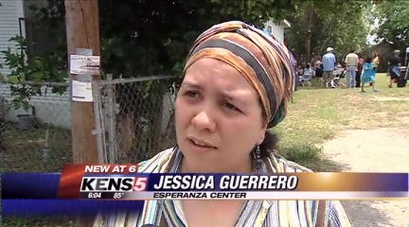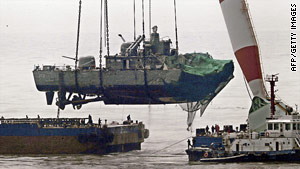The public-private response to the Gulf of Mexico oil leak showed more signs of strain Sunday as members of the Obama administration bashed BP's progress even as they acknowledged they had to rely on the oil giant's equipment and expertise to plug the blown-out well.
In one of the harshest government condemnations of the company to date, Interior Secretary Ken Salazar said BP had blown "deadline after deadline" and had not "fulfilled the mission it was supposed to fulfill."
"I am angry and I am frustrated that BP has been unable to stop this oil from leaking and to stop the pollution from spreading," Salazar said at a Houston news conference. "We are 33 days into this effort and deadline after deadline has been missed."
» Don't miss a thing. Get breaking news alerts delivered to your inbox.
The federal government could resort to taking over tasks now controlled by BP, Salazar suggested. "If we find they're not doing what they're supposed to be doing, we'll push them out of the way appropriately," he said.
Coast Guard Rear Adm. Mary Landry later accused BP of not responding efficiently enough as oil bore down on Louisiana communities west of the Mississippi River.
Unlike previous news conferences, in which federal officials referred to the oil giant as "our partner," Landry referred Sunday to BP as "the responsible party."
"I did have to apply pressure to BP over the last few days," she said in a news conference in Louisiana. "There was a lot of equipment there that wasn't being deployed appropriately or quickly enough for my satisfaction. So we put our foot down with that."
Those comments stood in contrast to morning news show remarks from Landry's superior, Coast Guard Commandant Adm. Thad Allen, who said he trusted Tony Hayward, BP's chief executive, and described the company as responsive.
"When I give them direction or the federal on-scene coordinator gives them a direction, we get a response," he told host Candy Crowley on CNN's "State of the Union" show. "I've got Tony Hayward's personal cellphone number. If I have a problem, I call him."
Asked if BP was "in charge" of the effort to stop the leak, Allen said, "I don't think it's an issue of control." But he acknowledged that "access to the discharge site is controlled by the technology that was used for the drilling, which is owned by the private sector. They have the eyes and ears that are down there. They are necessarily the modality by which this is going to get solved. Our responsibility is to conduct proper oversight to make sure they do that."
BP Managing Director Bob Dudley, on the same program, said that criticism from elsewhere in Washington, particularly an assertion from Rep. Edward J. Markey (D-Mass.) that BP could not be trusted, "hurt a little bit."
"All of us at BP are trying to solve the problem," he said.
The mixed tone from federal officials came amid growing frustration over failed efforts to contain the month-old leak, which has spewed an estimated 7 million gallons of oil into the gulf, possibly much more.
BP intends to try to plug the leak as early as Tuesday by jamming it with mud, an operation called a "top kill." If the top kill and subsequent short-term plans fail, the oil could continue leaking until August, when the company hopes to complete a relief well.
After a boat tour of the gulf Sunday, Louisiana Gov. Bobby Jindal criticized BP and the federal government, saying the state was taking its own measures to block encroaching oil by erecting sand barriers and other devices in front of the fragile inland marshes.
He criticized the Army Corps of Engineers for failing to render a faster approval of a state plan to dredge and build barrier islands far offshore to keep the oil out of the marshes.
"Every day we are not given the authorization to move forward and create more of these sand booms is another day where that choice is made for us, and more and more miles of our shore are hit by oil," Jindal said.
A corps spokesman said the agency was proceeding with the governor's request under emergency rules, but still had to comply with a federal environmental impact law that requires advice from other agencies.
Jindal also said that requested boats, skimmers and barges were in short supply, and that he discovered crews ready to work who were facing bureaucratic hurdles.
"It's clear the resources needed to protect our coast are not here," he said.
The Republican governor's response was one of a number of indications that the outrage over the growing disaster may prove as tricky to contain for the Obama team as the oil itself.
From the left this week, Democratic operative James Carville, a Louisianan, said the administration was "naive" to trust BP to do the right thing. From the right, Rand Paul, the Kentucky Republican Senate candidate, called out the administration's aggressive anti-BP language, particularly Salazar's "boot heel" comments.
"I think that sounds really un-American in his criticism of business," Paul said.
Since the April 20 blowout and explosion that killed 11 workers and eventually sank the Deepwater Horizon rig, BP and the government had mostly presented a public image of cooperation and comity, holding joint news conferences and billing their effort as a "unified command."
The good vibes appeared to fray last week as large amounts of oil washed ashore, and as the Environmental Protection Agency ordered BP to stop using the dispersant it was spraying to break up the oil, an order BP refused.
On CBS' "Face the Nation," Obama spokesman Robert Gibbs defended the federal response. "I don't think anybody could credibly say ... that the government has stood around, done nothing and hoped for the best," he said. "We were activated the moment that this oil rig exploded."
The administration plans to inundate the Gulf Coast this week with some of its highest-ranking officials, including Salazar and Homeland Security Secretary Janet Napolitano, who will fly over the spill zone Monday with a bipartisan group of senators and meet with Jindal and other officials.































